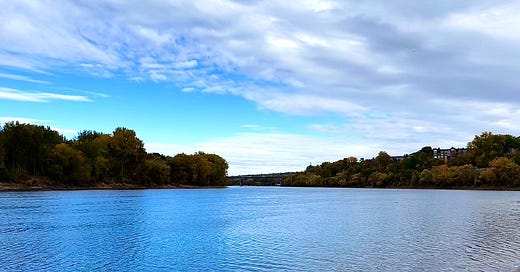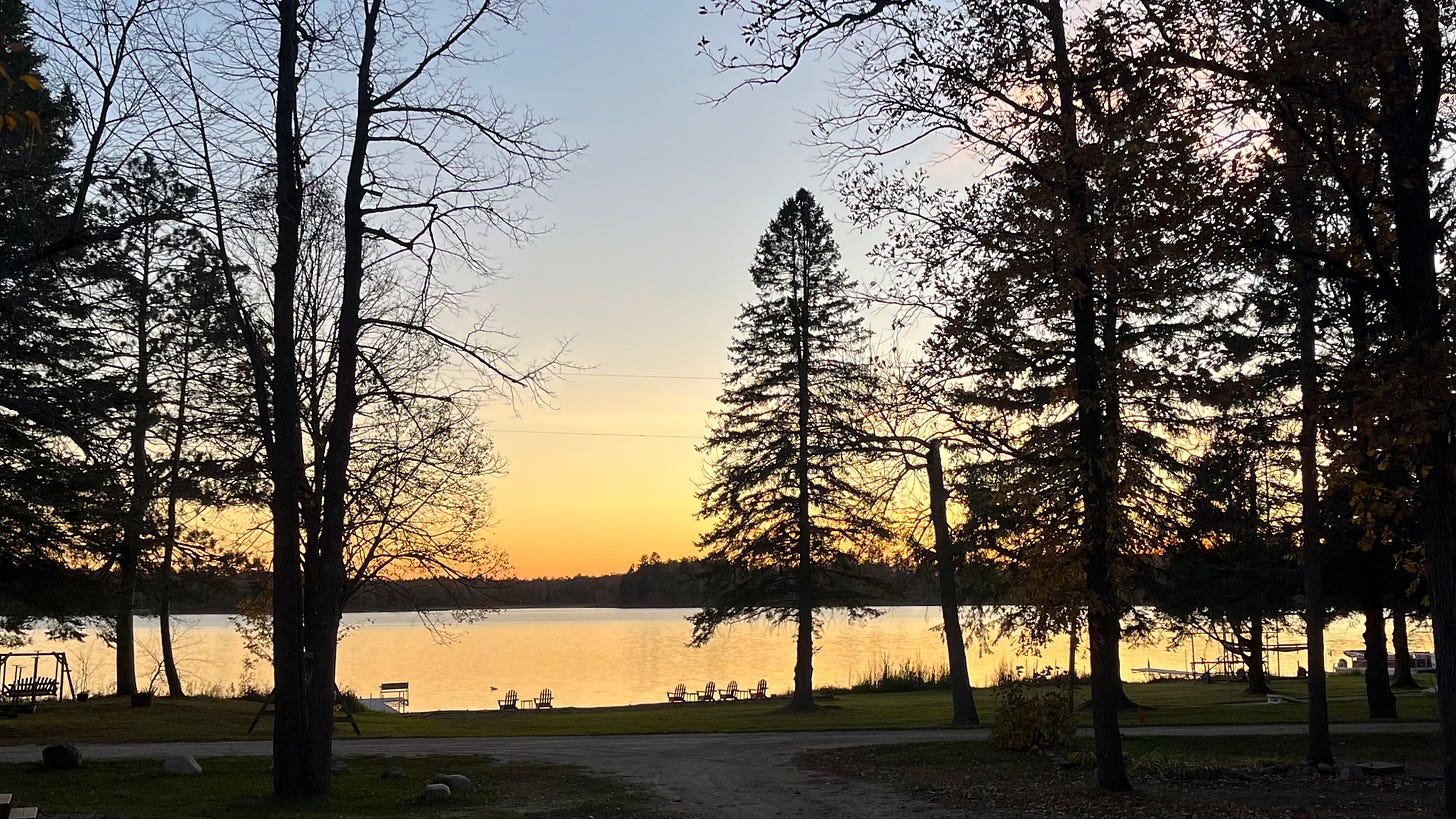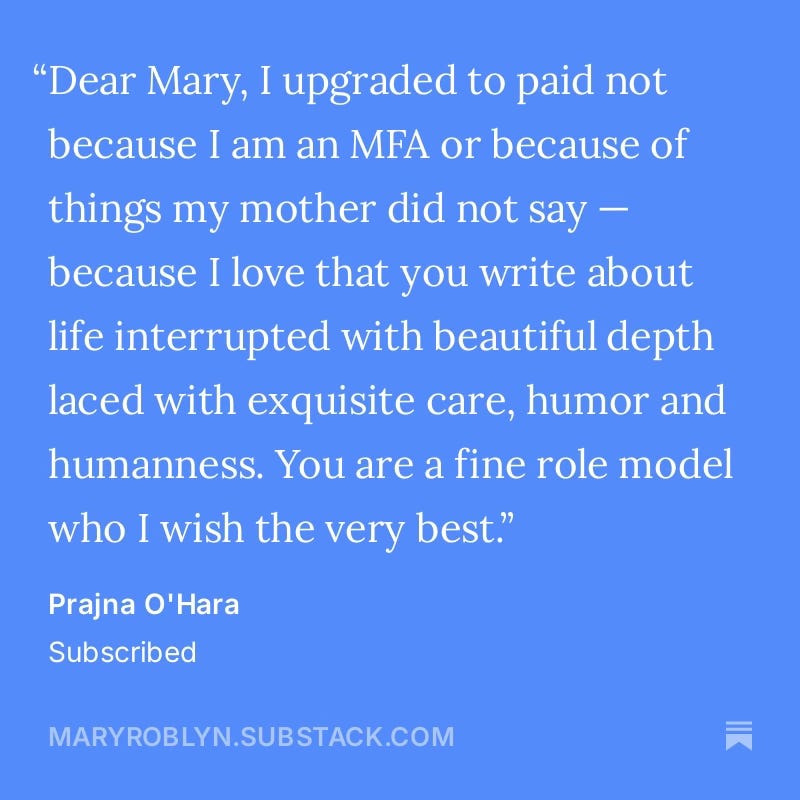The driver of the black pickup that had been riding my tail for miles made his move. He lurched into the right lane, sped up, swerved in front me. Slowed down. Sped up, engine loud and menacing. Slowed again. Then he roared off, middle fingers raised and circling in the air.
“Hey you. Both hands on the wheel. Where did you learn to drive?” Black pickups: did their drivers think that by owning one, they owned the road? Why the need to dominate? I was a sixty-eight-year-old woman driving a white compact SUV, like half of the nation’s population. The guys in pickups were bullies: steel-toed boots versus the vehicular equivalent of sensible shoes.
I looked down at my speedometer. Forty-three in a seventy-mile zone.
It occurred to me that I must have been doing the same thing: speeding up, slowing down. I moved over a lane and concentrated on keeping up with the speed of traffic. I didn’t want to be stopped for driving while old.
My Apple watch shuddered against my wrist: Time to stand. After a hundred rigid miles in the driver’s seat, the annoying directive made sense. I needed to release some tension. I watched for the next exit.
I hadn’t slept in thirty-four hours.
I was on a mission. My goal was to drive the two hundred miles north from St. Paul, Minnesota, to the headwaters of the Mississippi River. Once there, I planned to scatter my husband’s ashes, sending them 2,340 miles down North America’s longest waterway to the Gulf of Mexico.
He’d died eighteen months earlier, in April, 2023. It was now October, 2024, close to what would have been his seventy-second birthday. Even in death, he was getting crankier with age. His ashes were in a black plastic box, from which he seemed to be calling out impatiently: Let me out of here.
The Mississippi River begins in northern Minnesota, at a place called Lake Itasca. The name was pieced together from the Latin words veritas (truth) and caput (head). It had a perfectly good Ojibwe name, Omushkos. But the translation was dull: Elk Lake. Henry Rowe Schoolcraft, guided there in 1832 by the Ojibwe leader Ozawindib, liked making up words and putting them on maps.
Veritas. Caput. Itasca: true head of the Mississippi.
You’ll find photos like the one below in countless households across Minnesota. Lake Itasca is a place of pilgrimage, of secular ritual. A natural-looking dam, thirty-two feet across, marks the headwaters. Signs alert you to slippery rocks. No one pays attention. Why else would you be here? It’s the one place to cross the Great River (Misi-ziibi in Ojibwe) on foot. Walk on the rocks. If you slip, the water’s eighteen inches deep.
I came here with my family when I was a kid; we brought our daughter and son when they were kids. From Itasca, the river hooks northwards, then cuts a channel to the southeast. A few hundred miles downstream, wide and deep, it flows near my house. Crossing a nearby bridge from the St. Paul side to Minneapolis is a brisk five-minute walk. The view is spectacular.
Bald eagles and hawks nest along the urban banks. I’ve seen ted and gray foxes. Deer. At night, coyotes yip. Some years, they’re bold enough to roam the neighborhood. My husband saved security camera footage of a coyote tearing through our yard chasing the neighborhood cat. He never tired of watching it.
Given this history, scattering his ashes at the headwaters seemed like the obvious idea. In the parking lot of the convenience store off the highway, guzzling my second Red Bull, I wasn’t so sure.
I shouldn't have been driving at all. My nocturnal schedule, always erratic, had deteriorated even more. Most nights, I sat at my desk, staring at my screen until the sun came up. I’d started taking my laptop to bed. Finally, unable to sleep or write, I paced, ranted, erupted in outbursts of fury and despair.
“You need to get away, Mom.”
My daughter ran her hand along the edge of the glass fixture in the dining room, where dust had caked in a dark line. I hadn’t cleaned it since he died. I couldn’t recall the last time I vacuumed.
“I can’t leave Mini.” My sweet elderly cat is half-blind, mostly deaf, with no sense of object permanence. How would she know I hadn’t disappeared forever, as my husband had?
I imagined full-throated declarations that she’d caught yet another stuffed panda trailing off into sorrow as she searched for the one person who knew how to turn that softball-sized toy into a bowl of Fancy Feast.
“I’ll feed her. Let me find you a place to stay.”
After a three-minute Google search, she held up her phone. A cabin in the woods by a place called, unimaginatively, Crooked Lake. One hundred and eighty-two dollars a night.
“Highway robbery.”
“Mom, it’s cheap. And seventeen miles from the headwaters. Spend two nights. Get some rest. Then go scatter the ashes.”
I made reservations.
“Proceed to the route,” Siri said, as I swallowed a Five Hour Energy drink in one gulp. Chugging and gulping: not my normal ways of ingesting caffeine. But my eyes felt gritty and sunlight was fracturing at the edges of my field of vision. I needed a fast hit.
It was 3:30 p.m. I would make it there by five, if I managed to stay awake.
Another caffeine drink got me to the wide spot in the road that was the town near the cabin. Siri was quiet. I kept going. After ten miles of silence, I pulled onto the shoulder and examined the address I’d programmed into Maps. I’d transposed two digits. When I corrected the error, Siri woke up.
“Proceed to the route.”
“Which one?”
Why had I chosen the Posh Siri voice, that infuriatingly calm, carrying-on Brit? Why not Australian Siri? I could use a cheery G’day.
A loop of dirt roads showed up on my phone’s screen. I was six miles away from sleep. I drove, watching for signs. There were none. In this neck of the woods, people know where they are going and how to get there. They don’t always share that information.
Minnesotans will give you you directions to anywhere, is the saying, except the cabin. Had Siri absorbed that masked passive aggression that is the shadow side of Minnesota Nice?
“Proceed to the route.”
She hadn’t. Where I live, route rhymes with shout.
“Turn left.”
Seeing a gap between the trees, I turned, then rounded a corner. When I saw what was ahead, I slammed on the brakes. Too late. The front end of the car pitched forward into a steep gully with a sharp spine of boulders. At the bottom of the hill, a house sagged in on itself, surrounded by torn fencing and rusting auto parts.
Was this my weekend getaway, or a meth lab in a car cemetery? I yanked up on the parking brake, opened the door and stepped out. Stones the size of basketballs shifted under my feet. The seat belt alarm pinged.
High thin mewing sounds escaped my throat. I was a baby animal, abandoned. Night was approaching, empty-handed. How was I to survive without hot water, soft pillows, wi-fi —
Wait.
My car was a Subaru Crosstrek. Before I bought it five years ago, I’d watched YouTube videos of a guy driving an identical car sideways up a mountain. Not once had I put it in off-road mode. No need: I never went off roads.
Back in the driver’s seat, I took a few deep breaths, waiting for my hands to stop shaking. Then I backed up, slowly.
The sounds of metal carnage assaulted me: I heard breaking, screeching, grinding. Somehow, I got back to that gap in the trees and onto the road.
“Proceed to the route.”
“I’ll tear you a new route!” I yelled.
Two hundred yards down the road, I took another left. In front of me was Crooked Lake, brilliant in the sunset. I pulled up next to Cabin 7.
“Arrived.”
I turned off the engine. It ticked and went silent.
No warning lights had come on. I got out and walked around the car, then crouched and peered underneath. Not a scratch, dent, or leak. No hissing from the tires. I could have spent the last five years driving sideways up a mountain, and the Crosstrek would still be in perfect shape. The noise I’d heard was my brain’s offloading of fatigue. The call was coming from inside the house.
With one bag in each hand — I’d leave the rest for morning — I climbed the front steps, found the key, pushed open the door and walked in.
Knotty pine, woodsy decor. Living room, kitchen, bathroom, bedroom.
Two stools at the kitchen counter. A double bed. I set my purse on the dresser and switched on the lamp. The light was soft and welcoming.
“Do you want the side by the window?” I said. A reflex.
The walls expanded into a vast solitude. For the first time since my husband died, I was staying in a place that wasn’t our home. I was alone.
The grief I thought I’d sidelined came rushing back. It slowed, crested like a wave, then fell heavily against me.
I went back to the living room. Still in my clothes, I curled into a fetal position on the sofa. After a while, I slept.
I woke up around eight to the sound of rain against the windows. Coffee. I got up and rummaged around. I’d brought my French press. Coffee. Where was it? I searched again.
One stick of butter. Half a loaf of bread. A pint of raspberries. Four clementines. A package of sliced cheddar. Grapes in a Zip-loc bag. One dozen Tate’s chocolate chip cookies. A leaking carton of half-and-half. Peanut butter. Granola. Gatorade. A single lime, can of ginger beer, and just enough vodka for one Moscow Mule. A bottle of the potent Scandinavian spirit called aquavit.
I’d ground those beans right before I left, and —
The container of Daybreak Blend was on my table at home.
There were two more Red Bulls in the car. I walked out into the rain and seized them. Sitting at the counter, soaked and chilled, I tipped one into my mouth.
Because the stove didn’t work or because I couldn’t figure out how to coax any of the burners into a whoosh of flame, I put my already-buttered grilled cheese sandwich on a plate and set it in the microwave. A minute later, I pulled out two slices of butter-soaked bread with an unmelted slice of cheese in the center. With a knife and fork, I cut off one corner and took a bite.
Inedible. I slid it into the trash.
“Why can’t you fix this?” I said to the husband-sized hole in my life. No response. Even the edges of that emptiness were starting to blur. They were losing the shimmer of his presence.
A year and a half. Each day, a tiny part of him slipped away, taking me piecemeal as well. To reassure myself, I reached into another bag, the one in which I’d packed his ashes.
Except that I hadn’t. The black box was on the table at home, next to the container of coffee.
Sorrow surged in my chest. To his ragged apparition, I whispered, “Help.”
(Next time: A Widow’s Journey, Part 2: Water of Life.)
Every time you share, like, or tell your friends about a post, you help me reach more readers. That makes me really happy.
Tell me what you think! And join the discussion. We’re a generous and vibrant community.
Writer, interrupted is a reader-supported publication. None of my work is behind a paywall. But a lot of time, energy, and love goes into writing these posts. If you value my work and have the means to do so, please consider a paid subscription. Here is what one recent paid subscriber had to say:
If you believe, like Prajna, that my writing brings beauty and meaning to your life, I hope you will join her. An annual subscription is $30, about the price of one hardcover book. A monthly subscription is $5. You may cancel at any time. If, like me, you’re on a fixed income, or if your life circumstances are challenging — but you’d still like to support my work! — let me know. Mary xo










Debra, your teacher taught you well. Creativity does not come from theorems. And there’s no valid distinction to be made to the importance of creativity among disciplines. I know many writers who are also visual artists, or chefs, or musicians, or all of the above. It also requires sensitivity and empathy. You are clearly there for your friends, even though your experiences are not identical. Thank you for your kind words, and for sharing your thoughts. Will deliver Part 2 soon.
Mary! You've added the art of the cliffhanger to your writing arsenal - you are unstoppable! You are far braver than I to go out into the wilderness alone, and the way you describe the trip, I was right there with you (yes, I would like the side by the window, thank you), and I had the urge to slap myself on the forehead when you realized you forgot the coffee - nooooo! I remember that black box, a slightly larger version of an index card filing organizer for recipes. I'm familiar with the fetal position as well, but I'm usually on the floor. I should try the couch. I can't wait to read part 2. Love you ❤️❤️❤️